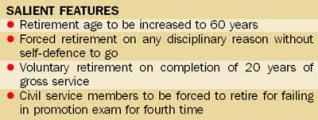Civil service law draft finalised
The government has proposed to increase the retirement age of civil service members to 60 years from the existing 57 years in the draft of the Civil Service Bill 2010 as it has put the draft into the final form.
The draft also proposes that the civil service members would not be forced to retire for any disciplinary reason with being given a chance of self-defence or departmental proceedings.
The government has said the law would ‘stop abuse of power’ and make the civil administration more accountable under a ‘system.’
The draft, prepared by the establishment ministry, will be posted online in a week to elicit public opinions on the proposed law, officials said.
 The draft proposes that public servants will deliver their responsibilities on the basis of impartiality, ‘not under the influence of any person, quarter or any political parties.’
The draft proposes that public servants will deliver their responsibilities on the basis of impartiality, ‘not under the influence of any person, quarter or any political parties.’
Officials must be neutral in delivering services to the public, the draft law stipulated.
‘The law is being framed to make the civil service system-centric as it is now individual-centric,’ the establishment secretary, Iqbal Mahmud, told New Age in his office on Monday.
He said the draft civil service law had been put into the final form and it would be posted online in a week to seek public opinions.
‘We are taking time to further examine the draft and trying to assess its possible consequences once it is made public,’ the secretary said, without disclosing any aspects of the proposed law.
He said that the ministry would hold consultation meetings with stakeholders, civil society actors and common people.
If civil service members fail in the examinations three times for promotion to the same position, they will be able to retire voluntarily and the government, on the other hand, will force them to retire in case of failure for the fourth time, according to the draft.
There is now no law to regulate the civil service although Clause 133 of the constitution says that the parliament may by law regulate the appointment and conditions of service of persons in the service of the republic.
The draft law is also aimed at regulating appointment, promotion, transfer and other terms of the public service. It suggests that the promotion and posting would be based on merit and performance.
As for draft, the cabinet secretary, M Abdul Aziz, who also headed a five-member review committee on the draft law, earlier said that draft of the civil service law had aimed at better service delivery to the public. ‘The civil service is now regulated by rules and regulations. But once the law is enacted, it will be a legal binding for the officials to serve the people,’ he added.
The draft law proposes a three-tier structure of the civil service – superior, senior and junior— which will be constituted with members of all cadres in the civil service, deputy secretaries, joint secretaries, additional secretaries and secretaries, the principal secretary and the cabinet secretary of the government and also Class I and II gazetted officials. And the cabinet secretary will head the civil service.
It also stipulates that public servants, for the sake of neutrality, would not do any person, group or political party any favour.
The retirement age of civil servants has been proposed to be 60 years instead of 57 years.
The draft proposes that no members of the civil service would be forced to retire for any disciplinary reason without being given any chance of self-defence or departmental proceedings.
Government officials have for long been demanding that their retirement age should be extended to 60 years and the provision for forced retirement should be scrapped.
According to the Public Servants (Retirement) Act 1974, the government may retire a civil servant from service any time after he has completed 25 years of gross service without assigning any reason. But the draft sets the voluntary retirement age at 20 years of service.
Public servants are often forced to retire on political considerations, according to officials concerned.




















